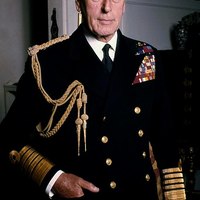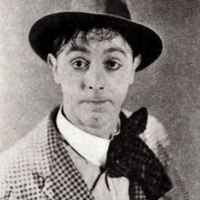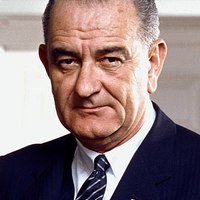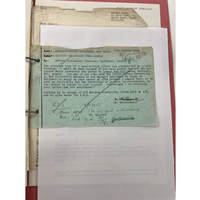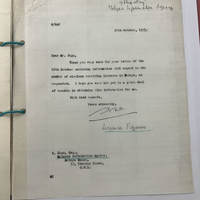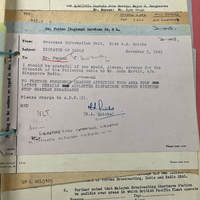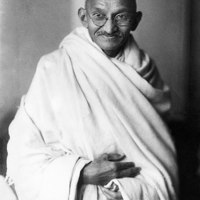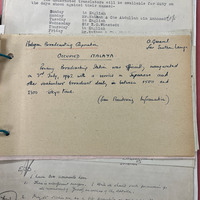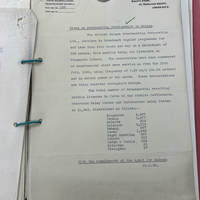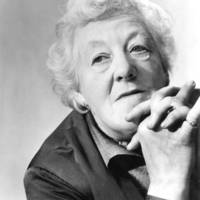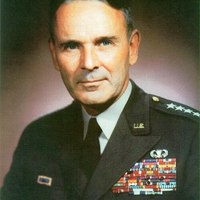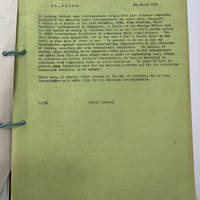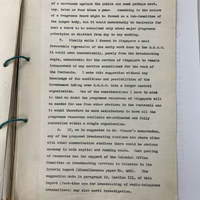Search
787 items
-
A Poet and his Public: Robert Graves discusses his relationship with the people to whom his work is offered. Graves explores the unjustified search for a public, his dependence on writing historical novels rather than poetry, and the true compulsion behind writing poetry. He defines a poet's 'public,' criticizes the evils of ambition and experimentation in young poets, and emphasizes why poetry should not be expected to pay. Graves reflects on being a 'secret friend' rather than a public figure. More »Spoken voice |Topic: Culture |Audio
-
An Actress and Her Public: a talk in which Dame Edith considers the responsibilities of her art, and her relationship with the people to whom it is offered. More »Spoken voice |Topic: Culture |Audio
-
Interview with Bernard Cousins, a 23-year-old Cambridge University undergraduate, from the BBC program "Personal Call." Bernard discusses his academic journey, the impact of army life on maturity, and the nuances of studying English literature at Cambridge. Touches upon the challenges of university life, the role of sports like rowing, and his aspirations in publishing and journalism. More »Spoken voice |Topic: Culture |Audio
-
Excerpt about discoveries at Corbridge and Sir Leonard Wooley. More »Spoken voice |Topic: Culture |Audio
-
Edmund Blunden (1896-1974) reads and comments on his own poems from 'Poems of Many Years,' published by Collins. Individual works are catalogued separately. Broadcasted by BBC Far Eastern Service (London Calling Asia) on 1957-08-15. Title: Lyric interludes. More »Spoken voice |Topic: Culture |Audio
-
Ruth Pitter on George Orwell: Ruth Pitter discusses her poetry and life in a conversation with a male speaker. The recording includes a talk by Ruth Pitter on George Orwell, where she recounts personal memories of Orwell and reflects on his impact on English thought. More »Spoken voice |Topic: Culture |Audio
-
Summary of a discussion on the future of socialism featuring Aneurin Bevan, Hugh Gaitskell, and Frank Byers. Topics include British progress, challenges of denationalization, potential industries for nationalization, and insights from Bevan and Gaitskell on socialist policies, parliamentary procedures, and the role of Trade Unions. Gaitskell emphasizes the need for maintaining controls to prevent inflation. More »Spoken voice |Topic: Politics |Audio
-
The recording from the Asian Club program features Ruth Pitter sharing insights on the modern school of classical poetry and Sir Edmund Hillary discussing an incident on Theron's Voyage to the Antarctic. The discussion delves into the influences leading to the emergence of the Modernist school of poetry. More »Spoken voice |Topic: Culture | Sport |Audio
-
Interview with Robert Vansittart by Stephen Black about the introduction of the typewriter at the (British) Foreign Office. Aired on BBC Far Eastern Service (London Calling Asia) on 1953-11-23. Reflects on the improvement of communications and the shift from quill pens to typewriters at the Foreign Office. More »Spoken voice |Topic: Culture |Audio
-
Excerpt from the program 'Personal Call' featuring a discussion on the work of a test pilot. Interviewed by Stephen Black, test pilot Peter Twiss shares insights into the challenges and experiences of his profession. Part of the BBC Far Eastern Service (London Calling Asia) broadcasted on 1956-06-18. More »Spoken voice |Topic: Military Conflict |Audio
-
In a historic recording titled "Long Live the Queen (Coronation Programme)," the evening of Queen Elizabeth II's coronation is celebrated with greetings from the people of the Commonwealth and their leaders in London. The program ends with a message from the Queen, introduced by Prime Minister Winston Churchill. Narrators Robert Donat and Edward Ward are featured, and special linking music is performed by the London Symphony Orchestra. The recording includes a montage of voices from across the Commonwealth, expressing loyal wishes to the Queen and celebrating the unifying influence of the Coronation celebrations. Notable figures, such as Prime Ministers from Canada, New Zealand, and Australia, also convey warm and personal wishes to the Queen, reflecting the global significance of her reign. More »Spoken voice |Topic: Politics |Audio
-
Leonard de Vries narrates a historical recording featuring Lord Stanley's greeting to the USA from Canada. More »Spoken voice |Topic: Culture | Politics |Audio
-
Admiral of the Fleet Albert Victor Nicholas Louis Francis Mountbatten, 1st Earl Mountbatten of Burma[1][2][n 1] (25 June 1900 – 27 August 1979) was a British statesman, naval officer, colonial administrator and close relative of the British royal family. He was born in the United Kingdom to the prominent Battenberg family. He was a maternal uncle of Prince Philip, Duke of Edinburgh, and a second cousin of King George VI. He joined the Royal Navy during the First World War and was appointed Supreme Allied Commander, South East Asia Command, in the Second World War. He later served as the last Viceroy of India and briefly as the first Governor-General of the Dominion of India. (Wikipedia) More »Person
-
Henry William George Lupino (16 June 1892 – 10 November 1959) professionally Lupino Lane, was an English actor and theatre manager, and a member of the famous Lupino family, which eventually included his cousin, the screenwriter/director/actress Ida Lupino. Lane started out as a child performer, known as 'Little Nipper', and went on to appear in a wide range of theatrical, music hall and film performances. Increasingly celebrated for his silent comedy short subjects, he is best known in the United Kingdom for playing Bill Snibson in the play and film Me and My Girl, which popularized the song and dance routine "The Lambeth Walk".[1] More »Person
-
Lyndon Baines Johnson (; August 27, 1908 – January 22, 1973), often referred to by his initials LBJ, was an American politician who served as the 36th president of the United States from 1963 to 1969. He became president after the assassination of John F. Kennedy, under whom he had served as the 37th vice president from 1961 to 1963. A Democrat from Texas, Johnson also served as a U.S. representative and U.S. senator. Born in Stonewall, Texas, Johnson worked as a high school teacher and a congressional aide before winning election to the U.S. House of Representatives in 1937. In 1948, he was controversially declared winner in the Democratic Party's primary for the 1948 Senate election in Texas and won the general election. He became Senate majority whip in 1951, Senate Democratic leader in 1953 and majority leader in 1954. In 1960, Johnson ran for the Democratic presidential nomination. Ultimately, Senator Kennedy bested Johnson and his other rivals for the nomination before surprising many by offering to make Johnson his vice presidential running mate. The Kennedy–Johnson ticket won the general election. Vice President Johnson assumed the presidency in 1963, after President Kennedy was assassinated. The following year, Johnson was elected to the presidency in a landslide, winning the largest share of the popular vote for the Democratic Party in history, and the highest for any candidate since the advent of widespread popular elections in the 1820s. Johnson's Great Society was aimed at expanding civil rights, public broadcasting, access to health care, aid to education and the arts, urban and rural development, and public services. He sought to create better living conditions for low-income Americans by spearheading the war on poverty. As part of these efforts, Johnson signed the Social Security Amendments of 1965, which resulted in the creation of Medicare and Medicaid. Johnson made the Apollo program a national priority; enacted the Higher Education Act of 1965, which established federally insured student loans; and signed the Immigration and Nationality Act of 1965, which laid the groundwork for U.S. immigration policy today. Johnson's stance on civil rights put him at odds with other white, Southern Democrats. His civil rights legacy was shaped by the Civil Rights Act of 1964, the Voting Rights Act of 1965, and the Civil Rights Act of 1968. His foreign policy prioritized containment of communism, including in the ongoing Vietnam War. He launched a full-scale military intervention in Southeast Asia, dramatically increasing the number of American military personnel deployed; casualties soared among U.S. soldiers and Vietnam civilians. In 1968, the communist Tet Offensive inflamed the anti-war movement and public opinion turned against America's involvement in the war. In Europe, Johnson maintained the postwar policies of his predecessors, by continuing to promote and foster political integration and economic cooperation among Western European nations.During his presidency, the American political landscape transformed significantly, as white Southerners who were once staunch Democrats began moving to the Republican Party and Black voters who sporadically supported the Democrats prior to 1964 began shifting towards the party in historic numbers. Due to his domestic agenda, Johnson's presidency marked the peak of modern American liberalism in the 20th century. Johnson faced further troubles with race riots in major cities and increasing crime. His political opponents seized the opportunity and raised demands for "law and order" policies. Johnson began his presidency with near-universal support, but his approval declined throughout his presidency as the public became frustrated with both the Vietnam War and domestic unrest. Johnson initially sought to run for re-election; however, following disappointing results in the New Hampshire primary he withdrew his candidacy. Johnson returned to his Texas ranch, where he died in 1973. Public opinion and academic assessments of his legacy have fluctuated greatly ever since. Historians and scholars rank Johnson in the upper tier for his accomplishments regarding domestic policy. His administration passed many major laws that made substantial changes in civil rights, health care, welfare, and education. Conversely, Johnson is strongly criticized for his foreign policy, namely presiding over escalated American involvement in the Vietnam War. (Wikipedia) More »Person
-
M. Whitehouse suggests that Newsheets and Letter (BBC_514) be sent back to Ismail Bin Ali of the Malay section of BBC London More »Message
-
M.A. Frost notes E. Jago's letter from October 12 1935 More »Message
-
M.A. Quicke copies HC Fenton's telegraph to WM Goatman informing him that the frequency changes in his area will cease. More »Message
-
Mohandas Karamchand Gandhi (ISO: Mōhanadāsa Karamacaṁda Gāṁdhī;[pron 1] 2 October 1869 – 30 January 1948) was an Indian lawyer, anti-colonial nationalist and political ethicist who employed nonviolent resistance to lead the successful campaign for India's independence from British rule. He inspired movements for civil rights and freedom across the world. The honorific Mahātmā (from Sanskrit 'great-souled, venerable'), first applied to him in South Africa in 1914, is now used throughout the world. (Wikipedia) More »Person
-
Lawson-Reece responds to the rewording of paragraph ii, agreeing to rephrasing. The rescheduling of the BBC Malaya rebroadcasts are also discussed. More »Message
-
States that the Penang Broadcasting Station has been inaugurated on July 3, 1942. More »Article
-
The Malayan Information Agency notes the number on licenses throughout the Straits Settlement. It also notes the experimental short wave done one June 19, 1938. More »Article
-
In a series of interviews with prominent Malaysians, recorded by interviewer John Tusa for two programs - "Malaysia: The Development of a State" and "Malaysia: Problems of Confrontation" - and broadcast in the General Overseas Service, the voice of Tusa is not heard in certain segments. The additional archive number is 30010, with a recording date of 0.3.1965. The scripts are listed under DTF, with an OTN number of 29852 and a transmission date of 13-Apr-1965. There are no annotations, and the conversation features speaker ANDAK Taib Bin Haji. The Rewind Asset ID is 60360644748d8fc68c9db329. More »Spoken voice |Topic: Business |Audio
-
In the Malaysian national music recording, unestablished instrumentation including the harmonium, violin, and percussion is used, with performers such as Negar Ku and Hamzah Dolmat of Rakan 2. The traditional instrumental Malaysian folk dance in the zapin style is performed by Hamzah Dolmat and his group using instruments such as the oud, violin, accordion, and drum. The recordingencompasses popular music, folk songs, folk dance music, and world and traditional music, with a focus on Asian culture. Hamzah Dolmat, a prominent violinist, and his group Rakan2 are featured in these recordings. More »Music (Instrumental) |Topic: Culture |Audio
-
This auditory exploration encompasses a repertoire of seven traditional Malaysian folk dances. Hamzah Dolmat, a distinguished violinist, collaborates with Rakan2, employing a diverse array of instruments including accordion, oud, guitar, mandolin, drums, tambourine, and bell-rattles. This ensemble offers a nuanced rendition, capturing the rich cultural tapestry of Malaysia. More »Topic: Culture |Audio
-
In a radio interview with David Willey of the World Service, Malik, the Foreign Minister of Indonesia, discussed the country's foreign policy. The interview took place on November 6, 1969, with no additional annotations. More »Spoken voice |Topic: Politics |Audio
-
Dame Margaret Taylor Rutherford, (11 May 1892 – 22 May 1972) was an English actress of stage, television and film. She came to national attention following World War II in the film adaptations of Noël Coward's Blithe Spirit, and Oscar Wilde's The Importance of Being Earnest. She won an Academy Award and a Golden Globe Award for her role as the Duchess of Brighton in The V.I.P.s (1963). In the early 1960s, She starred as Agatha Christie's character Miss Marple in a series of four George Pollock films. She was appointed an Officer of the Order of the British Empire (OBE) in 1961 and a Dame Commander (DBE) in 1967. (Wikipedia) More »Person
-
Maxwell Davenport Taylor (August 26, 1901 – April 19, 1987) was a senior United States Army officer and diplomat of the mid-20th century. He served with distinction in World War II, most notably as commander of the 101st Airborne Division, nicknamed "The Screaming Eagles." After the war, he served as the fifth chairman of the Joint Chiefs of Staff, having been appointed by President John F. Kennedy. He is the father of biographer and historian John Maxwell Taylor and of military historian and author Thomas Happer Taylor. A controversial figure, Taylor was considered, along with Secretary of Defense Robert McNamara, to have played a major role during the early days of the Vietnam War in the decision to deploy US combat troops to Vietnam and to escalate the conflict more generally. (Wikipedia) More »Person
-
Melville de Mellow (also de Mello) (1913 - 1989) was an Indian radio broadcaster with the All India Radio. He is remembered for his high-quality reports and commentary on various events in independent India, the most notable of which was a seven-hour broadcast of Mahatma Gandhi's funeral in Delhi. He was conferred the Padma Shri by the Government of India in 1963 in recognition of his services to broadcasting. (Wikipedia) More »Person
-
Cyril Conner states that there is no policy regarding offering facilities to commercial broadcasting services, and that the facilities are open to American correspondents. More »Message
-
Memorandum suggesting that the towers to be built not be under control of the provinces in which they are built but rather a centralised sub-comittee with representatives. More »Message
Show filters +




